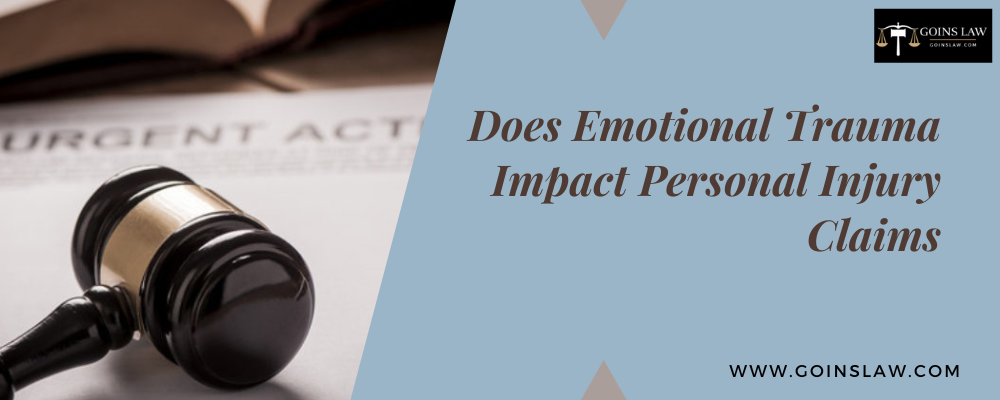
Does Emotional Trauma Impact Personal Injury Claims
Have you ever thought about whether emotional trauma can affect a personal injury claim? Most people hear terms like broken bones or surgery and less about the invisible but equally important psychological wounds of psychological trauma. While it may not be as easily perceived as physical injuries, emotional trauma can stand in a personal injury case.
Understanding Emotional Trauma
Most people develop emotional trauma emotionally after being exposed to such a stressful event like an accident or assault. Some of their symptoms may include anxiety, depression, and PTSD. The effects are purely mental and as devastating as any form of injury, which might alter every aspect of their lives, whether relationships or jobs.
However, for most individuals, the road to recovery following an injury is also about emotional recovery. The victim may experience intrusive flashbacks or nightmares or an exaggerated belief that death or harm is near. The symptoms must be identified at this stage not only for personal recovery but also due to legal reasons involved.
The Link Between Emotional and Physical Recovery
The reason why recovery can be so hard is that emotional and physical healing has a high level of interlinkage, and therefore, somebody suffering from anxiety or depression may slow down their physical recovery. This interlinkage means that the longer one lets untreated emotional trauma go, the longer it prolongs or complicates the healing process, making it imperative to treat both sides simultaneously.
In addition, courts have increasingly considered the emotional suffering involved in an injury. If a claimant is able to demonstrate that his/her emotional damage stems from his/her injury, it undoubtedly influences the damages awarded. Here, once again, lies the difference made by an in-depth understanding of the emotional aspect of a case.
The Financial Strain of Emotional Trauma
Let’s not forget the financial implications of emotional trauma. The medical bills can quickly add up, especially for individuals whose therapy or medication needs are regular. Victims will also likely incur lost wages due to their inability to work, whether it is because of a physical limitation or emotional distress. This financial burden can create a vicious cycle that further derails mental health and complicates recovery.
In a personal injury claim, it is crucial to account for all potential costs: medical expenses, lost wages, and long-term effects of emotional trauma. Often, these complexities sink the victim and make professional guidance so important.
Factors Influencing Damages for Emotional Trauma
When it comes to damages for emotional trauma, there are a number of factors involved:
- Severity of Symptoms: The more severe the emotional symptoms—such as anxiety or post-traumatic stress disorder—the higher the potential compensation. The court will consider the degree to which such disorders interfere with a person’s life.
- Loss of Enjoyment of Life: If emotional trauma interferes with a victim’s ability to enjoy things or to do things they loved doing, this, too, becomes a consideration that counts in determining the level of compensation. Loss of enjoyment of life is an important consideration that courts should take into their deliberation process.
- Medical Expenses: Treatment for emotional trauma is expensive. Claims usually require both previous and future medical expenses, thus ensuring the victims receive all the treatment they require.
- Loss of Earnings: Whenever emotional trauma impacts a person’s ability to work, claims for loss of wages or reduced capacity to earn are raised. Employers hardly consider emotional situations, and thus, secondary problems ordinarily crop up in a victim’s life.
Seeking Help: Professional and Community Support
The emotional impact of an injury can be incredibly overwhelming, but there is hope. Mental health professionals can teach coping techniques and provide a safe space to work through feelings. This may also be available in community support groups, giving opportunities to discuss experiences with others who understand.
Various community resources and rehabilitation programs exist. Such programs are meant to support people who heal from personal injuries. This avenue may offer not just practical assistance but also emotional support for rebuilding life.
Why Legal Support Matters
At the same time, when you navigate the intricacies of your recovery, you want and need equally to have legal support. Experienced attorneys can ensure you get fair compensation for both physical and emotional injuries. They know the nuances of personal injury law, thus helping to air the often-overlooked psychological damage.
Conclusion
Emotional damage is another significant aspect of the cases in personal injury litigation. No matter how slight, it should not be disregarded. This factor relates to both the result in your case and yourself. Thus, from this understanding, you will better position yourself to seek the right support you need and get the compensation you deserve.
If you are faced with a personal injury and are in need of assistance, do not wait to call on a professional lawyer who specializes in the law. At Goins Law, we comprehend the complexities surrounding emotional trauma and can help guide you through the motions required for your filing. Our class action lawsuit lawyers are here for you as you walk the road to recovery.




